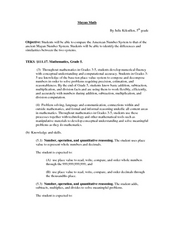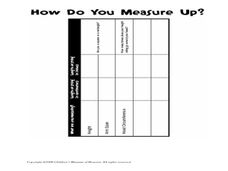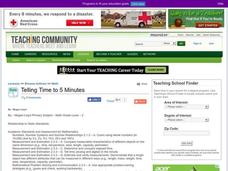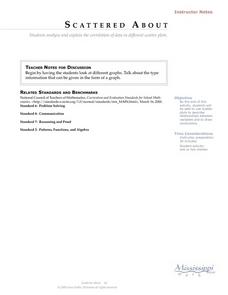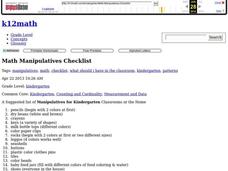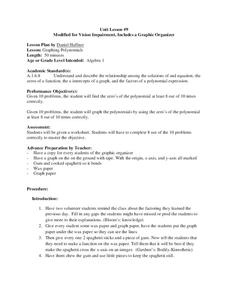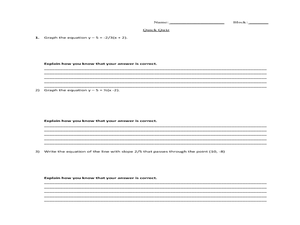Curated OER
WORKSHEET # 8 [4.4, 4.5, 4.6, 4.7, & 4.8]
In this college prep algebra worksheet, students combine like terms in 15 polynomial expressions. Students multiply polynomials in 18 expressions. Students divide 6 polynomial expressions. The rest of the 48 problems relate to the...
Curated OER
Mayan Math
Fifth graders investigate the Maya's as mathematicians. In this Mayan math lessons, 5th graders work with the ancient Mayan numbering system by comparing it to the American Number System. They tell the differences and similarities...
Curated OER
How Do You Measure Up?
Students measure their body. In this measurement lesson, students use a string to measure their height and the circumference of their head. They record this information on the worksheet provided and answer questions as a group.
Curated OER
Children's Museum of Houston - Pre/Post Classroom Activities - Nets
Young scholars make three dimensional shapes with nets. In this nets lesson, students receive nets which they fold to make a three dimensional object. They predict what shape each net will make and verify it after making the net. They...
Curated OER
Telling Time to 5 Minutes
In this second grade lesson your class will practice telling time. The goal is to tell time to five minutes using an analog clock. Your young students count by 5 minute intervals and discuss elapsed time.
Curated OER
Positive and Negative Numbers
Pupils use blocks and markers to illustrate the processes of adding, subtracting, multiplying and dividing integers. In this mathematics lesson, learners use Algebra blocks to demonstrate multiplying polynomials.
Curated OER
Scattered About
Students are introduced to the concept of scatter plots after reviewing the various types of graphs. In groups, they analyze the type of information one can receive from a scatter plot and identify the relationship between the x and y...
Curated OER
Hyperbolas
Students engage in a lesson that covers the concepts related to the graphing of hyperbolas looking at topics like foci, center, vertices, and asymptotes. They find multiple different points in the coordinate plain and then plot the graph.
Curated OER
Types of Functions and Composition of Functions
Algebra II classes solve problems relating to piecewise functions, step functions, and decomposition/composition of functions. They utilize links to work with real world examples. Mr. Pleacher has added humor to the activity by including...
Curated OER
Patterns
Explore early algebra by participating in a pattern identification activity using a random assortment of different household materials. The class creates, completes, and analyzes different patterns with the help of leggos, buttons,...
Curated OER
Lesson 2: The Quadratic Equation
Students graph quadratic equations. They use interactive graphs, on CD-ROM, to answer specific equations. Students identify the vertex of a parabola and the axis of symmetry.
Curated OER
Lesson Plan 3: Inequalities
Ninth graders study inequalities. After a teacher demonstration, classmates solve and graph inequality problems. In groups, they are assigned specific tasks that lead to the solving of inequality word problems.
Curated OER
M&M Exponential Activity
Students create a scatter plot of their experimental data. In this algebra lesson plan, students use M&M's to determine an algebraic model. They discuss results in class.
Curated OER
Factoring Trinomials
Students factor trinomials using algebra tiles and blocks. In this algebra lesson, students complete a trinomials station activity. They work backwords to find their answers and discuss their steps in a group.
Curated OER
Multiply Polynomials
Young scholars solve polynomial problems. In this algebra lesson, students multiply polynomial equations using FOIL and quadratic formula. They complete the square and factor by grouping.
Curated OER
Graphing Polynomials
Students graph polynomial equations using different methods. In this algebra lesson, students identify the different ways the x and y values relate in a graph. They solve for x by finding the zero's of the polynomials.
Curated OER
Linear Equations
Seventh graders explore battle plans using grids. In this linear equation lesson, 7th graders see how math is used in battle. Students create a grid on the floor using tape and plastic army men to serve as the points. Students discuss...
Curated OER
Factoring Trinomials
Students factor trinomials using specific factoring methods. In this algebra lesson, students factor equations using the difference of squares and foiling. They play a game to enhance their understanding of factoring.
Curated OER
Slope, slope-Intercept Form and Standard Form
Students investigate and solve linear equations using slopes. In this algebra lesson, students graph lines using the slope and y intercept. They also find the slope by rewriting their equation in to slope-intercept form from standard form.
Curated OER
Writing Number Sentences
Students practice writing number sentences. After reading real world problems, they describe the same situation by writing a number sentence. Students use algebra tiles, or counters, to demonstrate the use zero pairs in solving...
Curated OER
Slopes, Slope-Intercept Form, Standard Form
Students identify the slope of an equation using various methods. In this algebra lesson, students graph linear equations and calculate the slopes using the x and y intercept to solve the equations and graph the lines. They use the slope...
Curated OER
Linear Inequalities
Students solve linear inequalities. In this solving linear inequalities lesson, students solve one step inequalities algebraically. Students graph the solutions on a number line. Students compare the graphs of various inequalities such...
Curated OER
Veggie Chop and Data Analysis
First graders chop vegetables into fractions. In this fractions lesson, 1st graders cut vegetables, collect data about favorite vegetables and create a bar graph using the information. Students make inferences about the data and record...
Curated OER
Teaching with Collections
Young scholars examine collections. In these real-world collections lessons, students examine and describe buttons and shells. Young scholars will then sort, classify, and graph items according to various indicated descriptors.


![WORKSHEET # 8 [4.4, 4.5, 4.6, 4.7, & 4.8] Lesson Plan WORKSHEET # 8 [4.4, 4.5, 4.6, 4.7, & 4.8] Lesson Plan](http://content.lessonplanet.com/resources/thumbnails/160775/large/cgrmlwnvbnzlcnqymdezmdmzmc04ntg3ltf4ztu1dtquanbn.jpg?1414261468)
